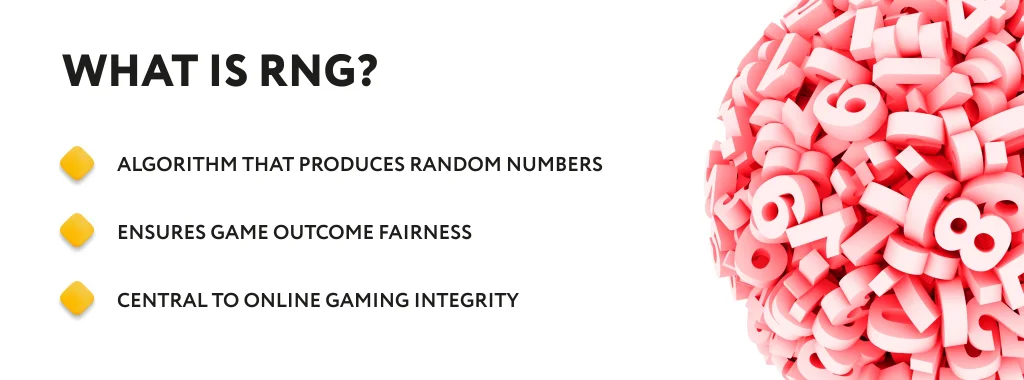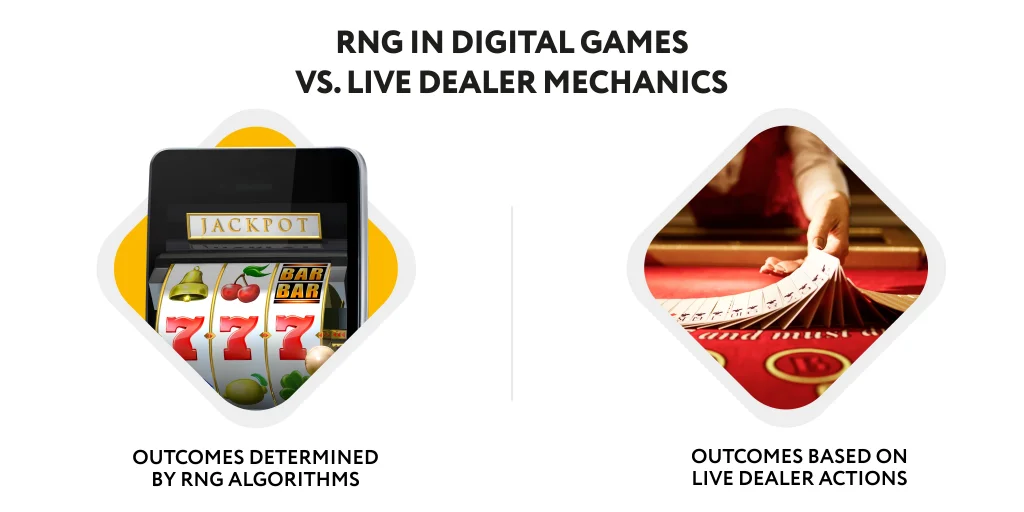In land-based casinos, the flip of a card, the roll of a dice, or the spin of a roulette wheel are all governed by luck. Well, mostly. Brick and mortar casinos were not 100% famous for the results not being rigged. For example, certain formulas are known for being able to predict dice rolls with greater accuracy, which is an issue.
Online gambling is not the same. New technologies satisfy the player’s need for security.
Players want to trust the games and casinos they choose. By starting a game, players hope to find out that they have a shot of winning, and the outcome is not predetermined. The random number generation algorithm, or RNG, guarantees transparency and an unbiased outcome in online casino games. It is a revolutionary system that has genuinely provided fair play.

What Does RNG Mean in iGaming
As you have already guessed, the RNG acronym stands for 'random number generator' or 'random number generation'. When talking about online casino games, RNG essentially refers to an algorithm that produces random numbers.
How do iGaming and random numbers relate? It is pretty apparent. Random numbers are used in online gambling to determine the outcome of a game round and, as a result, what the slot machine reels show.
Game Categories: RNG and Live Dealer
RNG in iGaming not only refers to the underlying algorithm of random number generator games (often slots). In broad terms, RNG games can be used as a blanket term for all games of chance. On the opposite spectrum we often distinguish Live Dealer games, where randomness is not determined by software as such.
Live dealer games offer an authentic land-based casino atmosphere and human interaction.
A live dealer game is essentially a stream, where a human croupier deals the cards, rolls the dice and spins the roulette wheel.
Slot machines are the most obvious example. A player presses a button, and an algorithm generates a series of images that appear on the slot machine reels and either add up to a win or do not add up to a win. There are other categories of games like video poker, table games, casual games, fishing games that rely on RNG and do not require human interaction as Live dealer games do.
The main difference is in the mechanics. While both types of games use technology, Live Dealer games depend more on human interaction since RNG-based games are more reliant on algorithms.
RNG-based games are powered by RNG technologies based on chance, namely a vector of random numbers.
RNG and iGaming: Use Cases
RNGs are used primarily by game providers. Game content developers need to ensure complete transparency in their products at any cost. Their main goal is to prove that the game is entirely unbiased and does not play into the hands of any party.
Essentially, RNG is an algorithm that is embedded in the game. The algorithm resides with the game files on a remote gaming server hosted by the game provider or a third party. Once there the RNG cannot be influenced.
BGaming is an example of a fast-growing iGaming content provider with certified RNG games. In addition, BGaming has a solid expertise in a provably fair approach which assists in checking the randomness of the game rounds even more thoroughly. Simply put, players can manually check a game round using the hash seed against its RNG algorithm.
How Does RNG Work: TRNG and PRNG
We normally distinguish between two types of RNG:
- HRNG (TRNG), which refers to a Hardware Random Number Generator or True Random Number Generator.
- PRNG, which refers to a Pseudo Random Number Generator.
The two methods share one goal: producing a sequence of random numbers, but they use completely different strategies.
- TRNG is a piece of physical hardware that generates randomness through a mechanical process. The physical device usually accounts for certain environmental indicators to produce an unexpected result. For example, such indicators can be the amplitude of atmospheric pressure over time, air temperature, or the number of button presses over a given period made by the player. The appliance takes measurements, converts them into values, and produces the final output. These end values cannot be predicted, which means that the result is purely random.
- PRNG is a software algorithm programmed to produce a random number sequence through a given value (or condition), commonly known as a ‘seed’. The PRNG does not require any external influence to produce a result: all it requires is the algorithm itself and the seed number. The seed is a key that defines the range of possible outcomes generators can produce. It is the first value that the hashing algorithm puts into its equations to determine the result. Even though PRNGs appeal to numbers, the outcome of the game is not always, or rather almost never, expressed in numbers. For example, in slots, each value corresponds to a tile with an image, which represents the round outcome on the player screen. So that's why we are talking here about a certain possibility of predicting PRNG outcomes. If you know the seed number and the maths principle, you can theoretically (in practice it's hardly achievable) determine what combinations of notional ‘cherries and lemons’ the slot machine algorithm will give out.
RNG Certification in iGaming
RNG audits confirm that each game is incorruptible and works on fair terms. These certifications are most often sought by the players themselves, who want to ensure that they are investing their money in a trustworthy casino that uses games from an official provider.
That is why RNG is the foundation of online gambling, which helps operators and game providers implement a "provable fairness" strategy. In short, a provably fair approach is a system that verifies and validates the trustworthiness of specific online gambling establishments to their audiences.
Why was the RNG algorithm chosen as the foundation? Simply put, you cannot beat the random number generator. There are nuances to the RNG types and how they work, but globally the mechanism helps to ensure complete fairness of the games without influencing the result. Ergo, nothing but luck can affect it.
Let's delve deeper into the details and find out who provides these certificates and how to obtain them.
- BMM Testlabs is a long-established independent laboratory that tests and certifies games. One of the most reputable authorities in gaming content, it has been working for more than 30 years. The BMM team can test any gaming content for RNG compliance regardless of the jurisdiction selected by the operators. Here, BMM takes a two-step approach to implement iGaming brand verification. First, preliminary content confirmation (RNG validation, mathematical consistency, functionality, etc.) is performed, followed by quarterly verification. As for the certificate itself, BMM experts perform a series of technical audits, after which a panel decides whether to issue a certificate of conformity.
- iTech Labs is one of the world leaders in testing and certifying online gaming systems, operating since 2004. iTech Labs now offers accreditation in Europe, Asia, and the Americas. The brand focuses on the regulations and restrictions of specific jurisdictions to ensure that their clients’ game content complies with current licensing requirements. The RNG certification process from iTech Labs consists of three stages. First, the team analyses and tests the code for vulnerabilities. Two steps of tests follow, including a set of diehard tests, which shows the system in action.
- Gaming Labs International (GLI) is another famous iGaming test lab certifying RNG-based games. Globally, GLI certificates are approved across regulated markets, making them desirable for iGaming brands. The process of verifying RNG algorithms depends on many factors but mainly involves the following steps:
- General RNG code overview
- Diehard Battery of Tests
- Outcome Distribution Tests
- eCogra (eCommerce Online Gaming Regulation and Assurance) is a London-based agency that inspects online gambling software and systems. The organisation's primary role is to protect player rights, guarantee fair games, and ensure provider responsibility. Technical experts conduct a detailed analysis to determine if the games offered comply with RNG requirements and function correctly. A positive audit results in a comprehensive report and eCorga certificate.

RNG is Not RTP, Not Completely
The concepts of RNG and RTP go hand in hand and are often mixed up between themselves.
As we have already mentioned, RNG is a technology that creates infinite strings of random numbers. Return-to-Player (RTP) measures the percentage of bets that are returned to the player as winnings. Even so, winning is not guaranteed; the RTP is just an indication of the likelihood of each game paying out.
From the very beginning of game development, there is a correlation between RNG and RTP. Before programming the RNG algorithm, a provider determines the RTP range or target for the game. Only after that, the RNG software is configured so that over the long run (over 1,000 game rounds at the very least) the theoretical RTP matches the planned one.
Two concepts exist conjointly but refer to different notions. While RNG ensures the casino’s integrity and the safety of its players, RTP evaluates how successful the operator is in implementing this strategy.
Trust the Maths
Online games of chance are impossible without random number generators. Indeed, players don't see the dealer shuffling the cards or rolling the dice; instead, a piece of code gets the job done.
It does not matter what type of RNG a brand relies on; what matters is that thanks to RNG technologies, operators can keep adding unpredictable, fair, and safe games to their portfolio, making RNG compliance the gold standard for iGaming.


